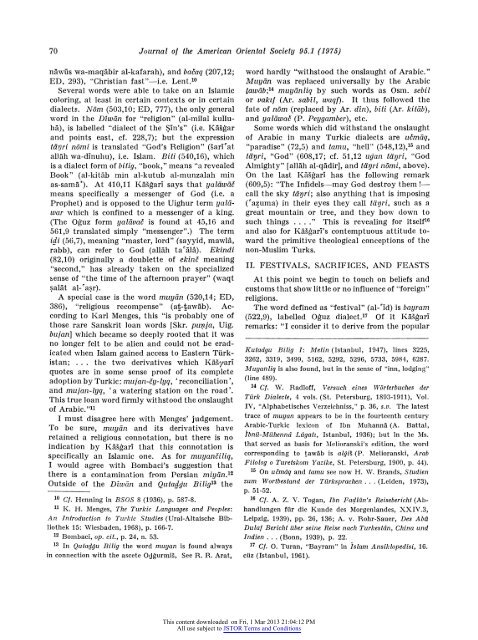Kashgari on the Beliefs and Superstitions of the Turks
Kashgari on the Beliefs and Superstitions of the Turks
Kashgari on the Beliefs and Superstitions of the Turks
Create successful ePaper yourself
Turn your PDF publications into a flip-book with our unique Google optimized e-Paper software.
70<br />
Journal <strong>of</strong> <strong>the</strong> American Oriental Society 95.1 (1975)<br />
nawius wa-maqabir al-kafarah), <strong>and</strong> bacaq (207,12;<br />
ED, 293), "Christian fast"-i.e. Lent.10<br />
Several words were able to take <strong>on</strong> an Islamic<br />
coloring, at least in certain c<strong>on</strong>texts or in certain<br />
dialects. Nom (503,10; ED, 777), <strong>the</strong> <strong>on</strong>ly general<br />
word in <strong>the</strong> Diwan for "religi<strong>on</strong>" (al-milal kulluha),<br />
is labelled "dialect <strong>of</strong> <strong>the</strong> Sin's" (i.e. Kasgar<br />
<strong>and</strong> points east, cf. 228,7); but <strong>the</strong> expressi<strong>on</strong><br />
td'ri nomi is translated "God's Religi<strong>on</strong>" (sari'at<br />
allih wa-dinuhu), i.e. Islam. Biti (540,16), which<br />
is a dialect form <strong>of</strong> bitig, "book," means "a revealed<br />
Book" (al-kitab min al-kutub al-munzalah min<br />
as-sama'). At 410,11 Kasgari says that yaldwac<br />
means specifically a messenger <strong>of</strong> God (i.e. a<br />
Prophet) <strong>and</strong> is opposed to <strong>the</strong> Uighur term yaldwar<br />
which is c<strong>on</strong>fined to a messenger <strong>of</strong> a king.<br />
(The Oguz form yalavac is found at 45,16 <strong>and</strong><br />
561,9 translated simply "messenger".) The term<br />
idi (56,7), meaning "master, lord" (sayyid, mawla,<br />
rabb), can refer to God (allah ta'ala). Ekindi<br />
(82,10) originally a doublette <strong>of</strong> ekinc meaning<br />
"sec<strong>on</strong>d," has already taken <strong>on</strong> <strong>the</strong> specialized<br />
sense <strong>of</strong> "<strong>the</strong> time <strong>of</strong> <strong>the</strong> afterno<strong>on</strong> prayer" (waqt<br />
salat al-'asr).<br />
A special case is <strong>the</strong> word muydn (520,14; ED,<br />
386), "religious recompense" (at-tawab). According<br />
to Karl Menges, this "is probably <strong>on</strong>e <strong>of</strong><br />
those rare Sanskrit loan words [Skr. punja, Uig.<br />
bujan] which became so deeply rooted that it was<br />
no l<strong>on</strong>ger felt to be alien <strong>and</strong> could not be eradicated<br />
when Islam gained access to Eastern Turk-<br />
istan; ... <strong>the</strong> two derivatives which KaSyari<br />
quotes are in some sense pro<strong>of</strong> <strong>of</strong> its complete<br />
adopti<strong>on</strong> by Turkic: mujan-cy-lyq, 'rec<strong>on</strong>ciliati<strong>on</strong>',<br />
<strong>and</strong> mujan-lyq, 'a watering stati<strong>on</strong> <strong>on</strong> <strong>the</strong> road'.<br />
This true loan word firmly withstood <strong>the</strong> <strong>on</strong>slaught<br />
<strong>of</strong> Arabic."11<br />
I must disagree here with Menges' judgement.<br />
To be sure, muydn <strong>and</strong> its derivatives have<br />
retained a religious c<strong>on</strong>notati<strong>on</strong>, but <strong>the</strong>re is no<br />
indicati<strong>on</strong> by Kasgari that this c<strong>on</strong>notati<strong>on</strong> is<br />
specifically an Islamic <strong>on</strong>e. As for muyanciliq,<br />
I would agree with Bombaci's suggesti<strong>on</strong> that<br />
<strong>the</strong>re is a c<strong>on</strong>taminati<strong>on</strong> from Persian miyan.l2<br />
Outside <strong>of</strong> <strong>the</strong> Diwdn <strong>and</strong> Qutadgu Bilig13 <strong>the</strong><br />
10 Cf. Henning in BSOS 8 (1936), p. 587-8.<br />
11 K. H. Menges, The Turkic Languages <strong>and</strong> Peoples:<br />
An Introducti<strong>on</strong> to Turkic Studies (Ural-Altaische Biblio<strong>the</strong>k<br />
15: Wiesbaden, 1968), p. 166-7.<br />
12 Bombaci, op. cit., p. 24, n. 53.<br />
13 In Qutadgu Bilig <strong>the</strong> word muyan is found always<br />
in c<strong>on</strong>necti<strong>on</strong> with <strong>the</strong> ascete Odgurmis, See R. R. Arat,<br />
word hardly "withstood <strong>the</strong> <strong>on</strong>slaught <strong>of</strong> Arabic."<br />
Muydn was replaced universally by <strong>the</strong> Arabic<br />
tawdb;14 muydnliq by such words as Osm. sebil<br />
or vakif (Ar. sabil, waqf). It thus followed <strong>the</strong><br />
fate <strong>of</strong> nom (replaced by Ar. din), biti (Ar. kitdb),<br />
<strong>and</strong> yaldwac (P. Peygamber), etc.<br />
Some words which did withst<strong>and</strong> <strong>the</strong> <strong>on</strong>slaught<br />
<strong>of</strong> Arabic in many Turkic dialects are ucmdq,<br />
"paradise" (72,5) <strong>and</strong> tamu, "hell" (548,12),15 <strong>and</strong><br />
tdyri, "God" (608,17; cf. 51,12 ugan tdyri, "God<br />
Almighty" [allah al-qadir], <strong>and</strong> tdyri n6mi, above).<br />
On <strong>the</strong> last Kisgari has <strong>the</strong> following remark<br />
(609,5): "The Infidels-may God destroy <strong>the</strong>m !-<br />
call <strong>the</strong> sky tdyri; also anything that is imposing<br />
('azuma) in <strong>the</strong>ir eyes <strong>the</strong>y call tdgri, such as a<br />
great mountain or tree, <strong>and</strong> <strong>the</strong>y bow down to<br />
such things ...." This is revealing for itself16<br />
<strong>and</strong> also for KaSgari's c<strong>on</strong>temptuous attitude toward<br />
<strong>the</strong> primitive <strong>the</strong>ological c<strong>on</strong>cepti<strong>on</strong>s <strong>of</strong> <strong>the</strong><br />
n<strong>on</strong>-Muslim <strong>Turks</strong>.<br />
II. FESTIVALS, SACRIFICES, AND FEASTS<br />
At this point we begin to touch <strong>on</strong> beliefs <strong>and</strong><br />
customs that show little or no influence <strong>of</strong> "foreign"<br />
religi<strong>on</strong>s.<br />
The word defined as "festival" (al-'id) is bayram<br />
(522,9), labelled Oguz dialect.17 Of it Kasgari<br />
remarks: "I c<strong>on</strong>sider it to derive from <strong>the</strong> popular<br />
Kutadgu Bilig I: Metin (Istanbul, 1947), lines 3225,<br />
3262, 3319, 3499, 5162, 5292, 5296, 5733, 5984, 6287.<br />
Muyanliq is also found, but in <strong>the</strong> sense <strong>of</strong> "inn, lodging"<br />
(line 489).<br />
14 Cf. W. Radl<strong>of</strong>f, Versuch eines Worterbuches der<br />
Turk Dialecte, 4 vols. (St. Petersburg, 1893-1911), Vol.<br />
IV, "Alphabetisches Verzeichniss," p. 36, s.v. The latest<br />
trace <strong>of</strong> muyan appears to be in <strong>the</strong> fourteenth century<br />
Arabic-Turkic lexic<strong>on</strong> <strong>of</strong> Ibn Muhanna (A. Battal,<br />
Ibni-Miihennd Lugati, Istanbul, 1936); but in <strong>the</strong> Ms.<br />
that served as basis for Melioranski's editi<strong>on</strong>, <strong>the</strong> word<br />
corresp<strong>on</strong>ding to tawab is algii (P. Melioranski, Arab<br />
Filolog o Turetskom Yazike, St. Petersburg, 1900, p. 44).<br />
15 On ucmdq <strong>and</strong> tamu see now H. W. Br<strong>and</strong>s, Studien<br />
zum Wortbest<strong>and</strong> der Tiirksprachen . . . (Leiden, 1973),<br />
p. 51-52.<br />
16 Cf. A. Z. V. Togan, Ibn Fadldn's Reisebericht (Abh<strong>and</strong>lungen<br />
fur die Kunde des Morgenl<strong>and</strong>es, XXIV.3,<br />
Leipzig, 1939), pp. 26, 136; A. v. Rohr-Sauer, Des Abu<br />
Dulaf Bericht iber seine Reise nach Turkestan, China und<br />
Indien ... (B<strong>on</strong>n, 1939), p. 22.<br />
17 Cf. O. Turan, "Bayram" in Islam Ansiklopedisi, 16.<br />
ciiz (Istanbul, 1961).<br />
This c<strong>on</strong>tent downloaded <strong>on</strong> Fri, 1 Mar 2013 21:04:12 PM<br />
All use subject to JSTOR Terms <strong>and</strong> C<strong>on</strong>diti<strong>on</strong>s
















